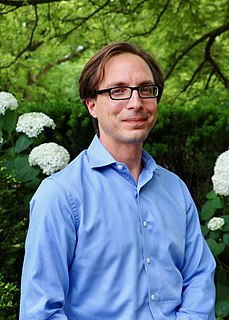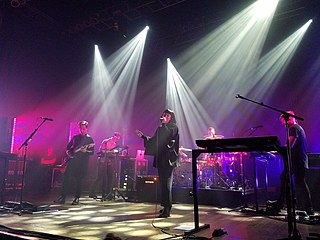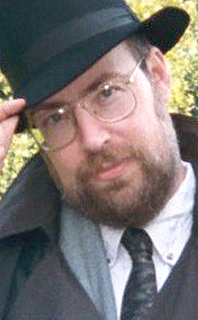Top 858 Editing Quotes & Sayings - Page 15
Explore popular Editing quotes.
Last updated on December 22, 2024.
People like me start organizing conferences and editing journals, even become tenured professors talking about Empire of the Senseless with a bunch of wide-eyed kids from the farmland. If only one of those kids goes back home and lets her hogs out of the pen to go plum wild rolling around in their own slop while the neighboring farmers scratch their chins, then, isn't that worth it? Insert the same scenario with stockbrokers, stock-car drivers, and stock characters in the post-baccalaureate working man's sideshow, and well, that's viral reproduction.
Ever since high school I've been writing in a spiral notebook, in pencil. Everything looks too polished on a computer when you start writing, and I can't really see it. I feel like the words are much more naked in pencil, on a notebook. I feel that my brain works differently, and words come out differently, if I have a pencil in my hand, rather than if I have a keyboard. I tend to add more in the margins. I tend to elongate the sentences as I'm writing and editing, and there is just something about the feeling of writing longhand that I really love.
Despite wanting to work in publishing, I was a publisher's worst nightmare: I rarely bought new books. So my goal was to publish the kind of books I would buy, and read. My reading habits have changed since starting the press. The only other "goal", per say, is to continue to experiment. I don't want the press to ever fall into a formula, or to be pigeonholed - "They do great reissues of modernist poets!" - I want to keep pushing, exploring the kind of title we can get away with. And working with authors who challenge the way I think about writing, editing and reading.
If you notice phrases, ideas, and anecdotes that closely resemble those that appear elsewhere in my writing, it's not a matter of sloppy editing. I'm repeating myself. I'm reshuffling words in the hope that just once I might say something exactly right. And I'm still wrestling with dilemmas that are not easily resolved or easily dismissed. I run at them again and again because I am not finished with them. Any may never be. Work-in- progress on a life-in-progress is what my writing is about. And some progress in the work is enough to keep it going on.
I write very raw, ugly, illiterate first drafts very quickly (novels are always in first draft in under a year) and then I spend years and years fine-tuning, revising, editing, etc. What inspires me? Who knows. I am not inspired that much. That’s why I write long form fiction - I am not much of a short story writer. Ideas come seldom, but when a good one comes, I really stick to it and see it out. I’m a problem-solver - I've never thrown out an entire manuscript; I've always forced myself to repair it until it was a lovable thing again.
Peeping through my keyhold I see within the range of only about 30 percent of the light that comes from the sun; the rest is infrared and some little ultraviolet, perfectly apparent to many animals, but invisible to me. A nightmare network of ganglia, charged and firing without my knowledge, cuts and splices what I see, editing it for my brain. Donald E. Carr points out that the sense impressions of one-celled animals are not edited for the brian: 'This is philosophically interesting in a rather mournful way, since it means that only the simplest animals perceive the universe as it is.
It's possible to think of photography as an act of editing, a matter of where you put your rectangle pull it out or take it away. Sometimes people ask me about films, cameras and development times in order to find out how to do landscape photography. The first thing I do in landscape photography is go out there and talk to the land - form a relationship, ask permission, it's not about going out there like some paparazzi with a Leica and snapping a few pictures, before running off to print them.
Your only guidepost is your own instinct and judicious editing. In my stand-up act I learned that in the first 10 minutes I could say anything and it would get a laugh. Then I'd better deliver. In the movie it's the same thing. You get a lot of laughs when people first sit down and then the story better kick in. Many years in front of an audience, I would hope, give me a sense of what works.
Over time it just got more and more intense as far as the trust factor. For example, when we started editing the film [Dream of Life], I thought, man, I need to make sense of all the footage I have; I need to ground the film. And one day I was hanging out in Patti's [Smith] bedroom, which is where Patti works, and in the corner of her bedroom is this great chair, and that's when she began showing her personal things to me. The camera was there, and we realized that we were really making the movie and making sense of the footage in the movie.
Alfred Hitchcock talked about planning out his movies so meticulously that when he was actually shooting and editing, it was the most boring thing in the world. But drawing comics isn't like shooting a movie. You can shoot a movie in a few days and be done with it, but drawing a comic takes years and years... That's the biggest part of doing comics: You have to create stuff that makes you want to get out of bed every morning and get to work.
For some reason at Sundance, more than other festivals that I'm aware of, you find filmmakers rushing to screen works that sometimes aren't completed. In my seven years of programming at Toronto, I'm not aware of any documentaries that went back for serious editing after their premiere - other than those presented as works-in-progress. But at Sundance every year there seems to be a few films that push the deadline so hard that they get taken back to the edit room afterwards.
The fact that I am constantly immersed in the act of legal writing and editing has made me a better and more efficient creative writer and editor. In the end, lawyers need to tell compelling stories when they write a brief or other legal argument. A successful lawyer understands that the judge is merely a person who is going to read that brief, which should articulate a compelling reason for the judge to rule in that lawyer's favor. In other words, a legal advocate needs to get the judge to care. That's not dissimilar to what a creative writer does.
[M]y first published book had just appeared in stores. The last year of my life-the year of finishing it, editing it, and seeing it through its various page-proof passes-ranks among the most unnerving of my young life. It has not felt good, or freeing. It has felt nerve-shreddingly disquieting. Publication simply allows one that much more to worry about. This cannot be said to aspiring writers often or sternly enough. Whatever they carry within themselves they believe publication cures will not, I can all but guarantee, be cured. You just wind up with new diseases.
Part of what makes a language 'alive' is its constant evolution. I would hate to think Britain would ever emulate France, where they actually have a learned faculty whose job it is to attempt to prevent the incursion of foreign words into the language. I love editing Harry with Arthur Levine, my American editor-the differences between 'British English' (of which there must be at least 200 versions) and 'American English' (ditto!) are a source of constant interest and amusement to me.
What would the world be like if you had to develop a power yourself before you could use it? Just as a silly example: How would the comment section on YouTube change if, to use it, you had to have the schooling necessary to have a basic understanding of how computers and the internet work? More seriously, would anyone smart enough to know how to design and build a tank, or a laser guided anti-aircraft missile, or a computer and video editing software be stupid enough to join ISIS? In fact, if such knowledge was required—would it even be possible for there to be standing armies?
Some artists, such as Jack Kirby, need no plot at all. I mean I'll just say to Jack, "Let's let the next villain be Dr. Doom" ... or I may not even say that. He may tell me. And then he goes home and does it. He's so good at plots, I'm sure he's a thousand times better than I. He just makes up the plots for these stories. All I do is a little editing ... I may tell him that he's gone too far in one direction or another. Of course, occasionally I'll give him a plot, but we're practically both the writers on the things.
I have a great editor and I enjoy, in a masochistic way, being ruthless about my own performance. How do I know, but I think I'm quite good at saying, "That's no good. That's no good. That's it. That's it. That's good." And I'm with the editor who goes, "No, I think you're wrong. That's not your best." There's an initial point in the editing, if you're directing yourself, especially in my case, where you go, "Ouch, ouch, ouch, I can't watch this." And then, there's a point where you become hard-nosed and just take your neurosis away and go, "What's working? That's okay. That's okay. We can lose that, and lose that." You get objective about it.
I think I'm a reporter's editor. Being a good reporter is a specific skill, one I admire and don't possess myself - I appreciate people who know how to ask the right questions, who are excellent researchers, who know how to assemble information, and I enjoy working with them to shape their information into an article. Good reporters tend to be receptive to editing, and to a more collaborative form of writing in general, and you always end up learning more from how they work than you expect you will.

















